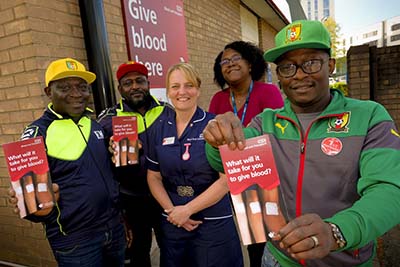Cameroon footballers from Manchester support call for more black blood donors
FOOTBALL team players are urging fellow black people to give blood.
Members of ‘2 Zero Manchester’ visited Plymouth Grove Donor Centre on Upper Brook Street to sign up as donors.
The players are all from Cameroon and they will be helping spread the word at a Cameroon National Day celebration at Wythenshawe Sports Ground on May 27th and 28th.People from the same ethnic background are more likely to have matching blood groups.
But there are not enough black donors, particularly donors with the valuable Ro blood subtype.
Ro is often crucial for people who need ongoing transfusions, such as sickle cell disease patients.
In Greater Manchester, only 2% of all donors are black.

NHS Blood and Transplant staff will be at the Cameroon day celebration to sign up new black blood donors.
And around 650 people attending the gala night at the AJ Bell stadium in Salford on May 28 will receive ‘Give Blood’ leaflets.
Footballer Jean-Martial Django, 43, from Alt, who is managing the national day event, used to be a regular donor in Cameroon.
Jean-Martial, who works in maintenance at Manchester University, said: "Everyone needs blood, and you need the right blood for the patient. What happens to sick people if they don’t get it?
"It feels amazing to give blood. You are giving life. If you can give someone that gift, why shouldn’t you?
"People don’t understand the need for Black African donors but when they understand, they are willing to give."
Jean Martial could not give a full donation on this occasion, because his blood was not flowing fast enough, but has arranged to come back again.
The footballers were also joined by Blaise Mendouo, a boxer who competed for Cameroon in the 2012 Olympics. Blaise now lives in Newton Heath and trains in Salford.
There are more than 31,000 blood donors in Greater Manchester but just 756 with the valuable Ro subtype.
People can sign up to donate online and the donor centres in Plymouth Grove and Norfolk House are ideal places for a first donation.
Richard Shortland, Head of Regional Blood Marketing, said: "We are incredibly grateful to the organisers of this event for their support.
"Blood donation saves lives and it’s vitally important that donors are representative of the population of the UK as a whole.
"It’s quick and easy to sign up as a new donor at blood.co.uk."
- For additional information please contact Stephen Bailey in the NHS Blood and Transplant Press Office on 0151 268 7017 or Stephen.bailey@nhsbt.nhs.uk
- Contact the NHS Blood and Transplant press office on 01923 367600 or via pressoffice@nhsbt.nhs.uk
- For out of hours enquiries please call: 0117 969 2444
Notes to editors
- NHS Blood and Transplant is a joint England and Wales Special Health Authority. We are responsible for ensuring a safe and efficient supply of blood and associated services to the NHS in England. We are also the organ donation organisation for the UK and are responsible for matching and allocating donated organs.
- We are an essential part of the NHS and take pride in saving and improving lives by making the most of every voluntary donation, from blood and organs to tissues and stem cells.
- Our work would not be possible without our donors - ordinary people doing extraordinary things by saving and improving the lives of others.
- Blood donors can search for sessions, book appointments, change/cancel their appointments and change their contact details in real time at www.blood.co.uk
- There are apps available for Android, Windows and Apple Smartphone and tablet devices which enable donors to search for sessions based on their location and book and manage appointments.
- Our donor line - 0300 123 23 23 - is available 24 hours a day, seven days a week with all calls charged at the standard local rate, even from mobile phones
- NHS Blood and Transplant needs to collect 1.5 million units of blood each year to meet the needs of patients across England. It’s important that we collect the right amount of each blood group at the right time to meet patient needs.
- There are four main blood groups – O, A, B and AB. Group O is the most common and therefore the most in demand. A regular supply of blood is vital – red cells last 35 days and platelets only 7 days.
- If you’re already a blood donor, you could become a dedicated platelet donor at one of our 22 dedicated donor centres. We particularly need platelet donors with the A negative and AB negative blood groups. One platelet donation can help up to three adults or twelve babies or children. Visit platelets.blood.co.uk
- The overall demand for blood is falling by 3-4% per year. This is due to improvements in clinical practice and is a trend that is being seen around the world. The drop in demand for blood is also thanks to our work with hospitals to ensure blood is used appropriately for patients.
- We need nearly 200,000 new blood donors each year to replace those who no longer donate for reasons such as ill health, pregnancy or foreign travel and to ensure we have the right mix of blood groups to match patient needs in the future
- Some blood groups, such as O negative (the universal blood group), A negative and B negative are particularly vulnerable to shortfalls. So we want people with those blood groups to donate as regularly as they can. We also need more black African, black Caribbean, mixed race and South Asian people to become blood donors to reflect the ethnic diversity of patients
- Female whole blood donors can give blood every 16 weeks, while male blood donors must wait 12 weeks between donations. Platelets can be donated every 2 weeks.
To find out more visit: www.nhsbt.nhs.uk
